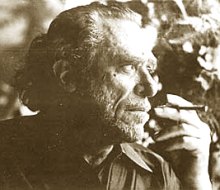Books like The Days Run Away Like Wild Horses Over the Hills
The Days Run Away Like Wild Horses Over the Hills
Once upon a time I went through a Buk phase, a time when he was the only thing I could read. He got me through some tough times, and for that, I’ll always love the dirty old man. But that was long ago, so I wondered if he was really as awesome as I remembered, or if he just resonated with me because of where my head was at. So I picked up this early collection of poems and once again I was struck by the depth of meaning and emotion. Bukowski is important. His is the voice of a people who aren’t usually celebrated in literature ~ bums and whores, low lifes and riff raff, barflies and jailbirds, madmen and drunks. He speaks their language, for they are his people. It is a language that is raw and often vulgar, but it is also sensitive and poignant, beautiful and true. His portrayal of animals, for instance, reveals his compassion for the marginalized and vulnerable as much as his portrayal of destitute men and women. In “conversation on a telephone,” he describes a bird dying in the jaws of a cat. In “peace,” hunters shoot doves, the symbols of peace. In “ice for eagles,” he presents the goodness of a horse, in contrast to his own abusive father.But The Days Run Away Like Wild Horses Over The Hills is dedicated to Jane and it is the poems about her that move me the most. In “for Jane: with all the love I had, which was not enough: —” he looks though his dead loves’ possessions, her dresses, her jewelry:“and I call God a liar,I say anything that movedlike thator knewmy namecould never diein the common verity of dying, ”In the end he laments that “they will not/give her back to me. ”He runs the gamut of emotions as he works through his grief. In “notice,” he vents his helpless anger:“the swans drown in bilge water,take down the signs,test the poisons,barricade the cowfrom the bull,the peony from the sun,take the lavender kisses from my night,put the symphonies out on the streetslike beggars,get the nails ready,flog the backs of the saints,stun frogs and mice for the cat,burn the enthralling paintings,piss on the dawn,my loveis dead. ”For me, this is the most powerful poem in the collection. It also demonstrates why Bukowski’s vulgar language is not gratuitous, but an often essential component of his poetry. Those last three lines ~ “piss on the dawn,/my love/is dead” ~ cut to the heart of it. Hear the bitterness of his voice, the words uttered through clenched teeth, the pain made manifest in his sweeping dismissal of the whole damn world. In “spring swan,” he identifies a dead swan with his beloved Jane:“and I felt guilty for the swanas if deathwere a thing of shame”It is a common theme in poetry ~ how life goes on all around the one who grieves for the dead. There is a loneliness in such grief, for the grieving one is an outsider to life.And then there is the tenderness, the love that transcends death, in “for Jane”:“what you werewill not happen again. ”And “remains”:“this will never leave me:that I had loveand love died; ”So again I read these lines and again tears well up in my eyes and if by chance you see them, I will say they are for Buk.
